Mental Health: Recovery Principles and Care Provision Essay
VerifiedAdded on 2022/09/06
|8
|2367
|21
Essay
AI Summary
This essay examines the critical role of recovery principles in mental health care, emphasizing their impact on patient well-being and treatment outcomes. It explores the historical context of mental health challenges and the evolution of the recovery approach. The essay delves into core principles such as self-direction, empowerment, holistic care, and the importance of hope and responsibility in the recovery journey. It discusses the implementation of these principles in healthcare settings, highlighting the benefits of patient-centered care, therapeutic relationships, and community integration. The essay also acknowledges challenges in adopting the recovery approach, such as time constraints and the need for collaborative decision-making, while emphasizing the importance of addressing these challenges through peer support, multidisciplinary meetings, and clinical guidance. Ultimately, the essay advocates for the widespread adoption of recovery principles to foster patient autonomy, improve quality of life, and promote successful mental health recovery.
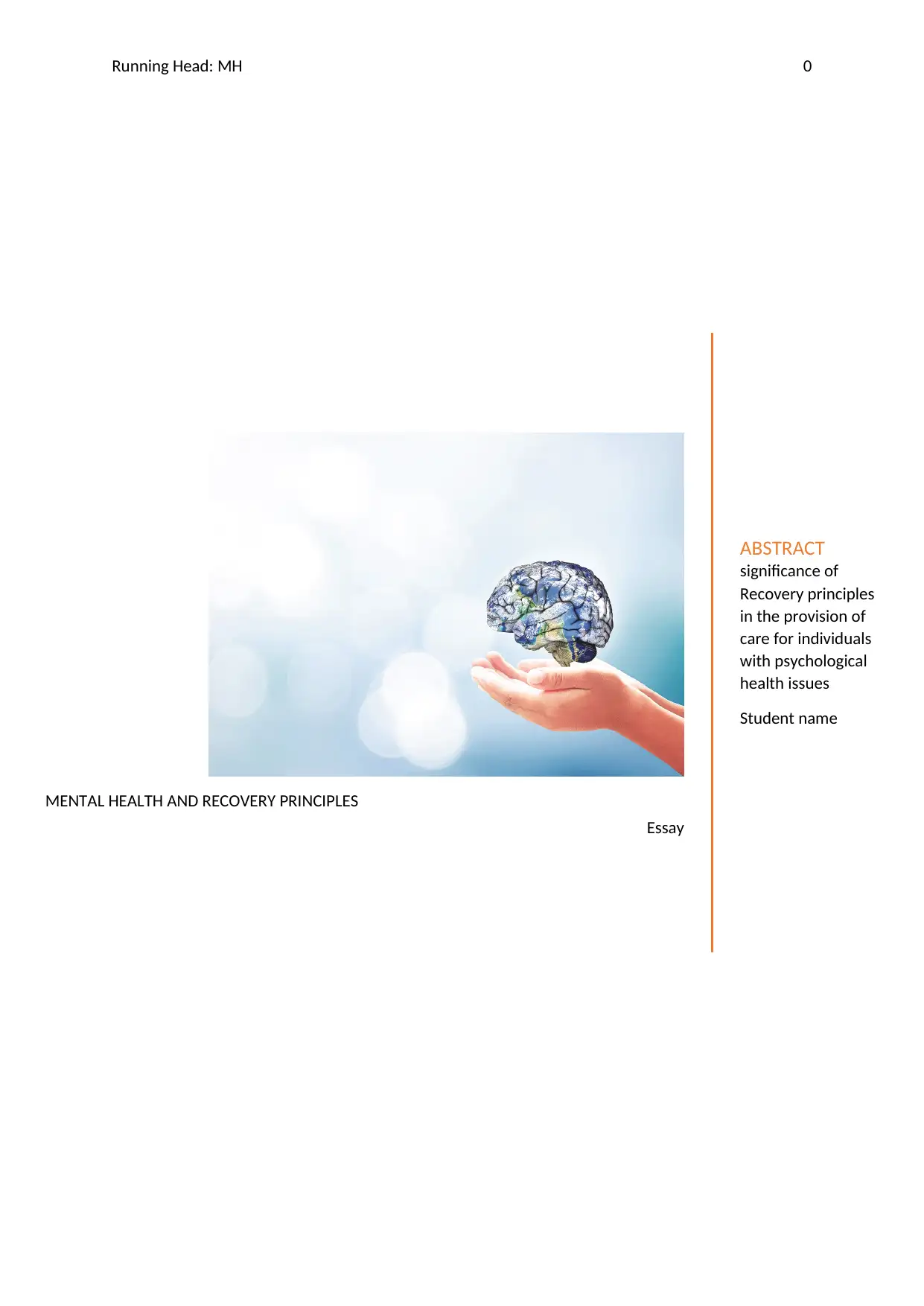
Running Head: MH 0
MENTAL HEALTH AND RECOVERY PRINCIPLES
Essay
ABSTRACT
significance of
Recovery principles
in the provision of
care for individuals
with psychological
health issues
Student name
MENTAL HEALTH AND RECOVERY PRINCIPLES
Essay
ABSTRACT
significance of
Recovery principles
in the provision of
care for individuals
with psychological
health issues
Student name
Paraphrase This Document
Need a fresh take? Get an instant paraphrase of this document with our AI Paraphraser
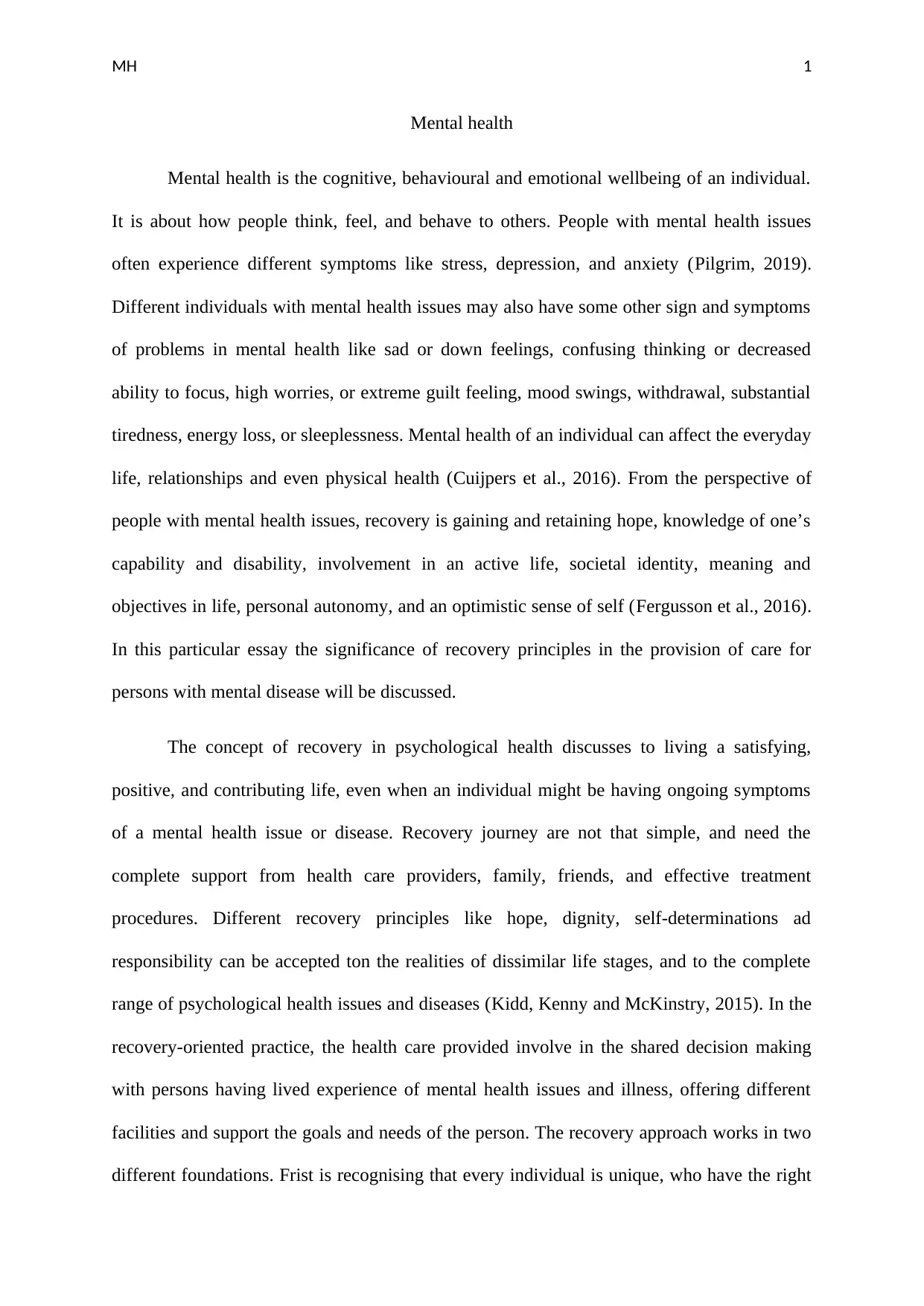
MH 1
Mental health
Mental health is the cognitive, behavioural and emotional wellbeing of an individual.
It is about how people think, feel, and behave to others. People with mental health issues
often experience different symptoms like stress, depression, and anxiety (Pilgrim, 2019).
Different individuals with mental health issues may also have some other sign and symptoms
of problems in mental health like sad or down feelings, confusing thinking or decreased
ability to focus, high worries, or extreme guilt feeling, mood swings, withdrawal, substantial
tiredness, energy loss, or sleeplessness. Mental health of an individual can affect the everyday
life, relationships and even physical health (Cuijpers et al., 2016). From the perspective of
people with mental health issues, recovery is gaining and retaining hope, knowledge of one’s
capability and disability, involvement in an active life, societal identity, meaning and
objectives in life, personal autonomy, and an optimistic sense of self (Fergusson et al., 2016).
In this particular essay the significance of recovery principles in the provision of care for
persons with mental disease will be discussed.
The concept of recovery in psychological health discusses to living a satisfying,
positive, and contributing life, even when an individual might be having ongoing symptoms
of a mental health issue or disease. Recovery journey are not that simple, and need the
complete support from health care providers, family, friends, and effective treatment
procedures. Different recovery principles like hope, dignity, self-determinations ad
responsibility can be accepted ton the realities of dissimilar life stages, and to the complete
range of psychological health issues and diseases (Kidd, Kenny and McKinstry, 2015). In the
recovery-oriented practice, the health care provided involve in the shared decision making
with persons having lived experience of mental health issues and illness, offering different
facilities and support the goals and needs of the person. The recovery approach works in two
different foundations. Frist is recognising that every individual is unique, who have the right
Mental health
Mental health is the cognitive, behavioural and emotional wellbeing of an individual.
It is about how people think, feel, and behave to others. People with mental health issues
often experience different symptoms like stress, depression, and anxiety (Pilgrim, 2019).
Different individuals with mental health issues may also have some other sign and symptoms
of problems in mental health like sad or down feelings, confusing thinking or decreased
ability to focus, high worries, or extreme guilt feeling, mood swings, withdrawal, substantial
tiredness, energy loss, or sleeplessness. Mental health of an individual can affect the everyday
life, relationships and even physical health (Cuijpers et al., 2016). From the perspective of
people with mental health issues, recovery is gaining and retaining hope, knowledge of one’s
capability and disability, involvement in an active life, societal identity, meaning and
objectives in life, personal autonomy, and an optimistic sense of self (Fergusson et al., 2016).
In this particular essay the significance of recovery principles in the provision of care for
persons with mental disease will be discussed.
The concept of recovery in psychological health discusses to living a satisfying,
positive, and contributing life, even when an individual might be having ongoing symptoms
of a mental health issue or disease. Recovery journey are not that simple, and need the
complete support from health care providers, family, friends, and effective treatment
procedures. Different recovery principles like hope, dignity, self-determinations ad
responsibility can be accepted ton the realities of dissimilar life stages, and to the complete
range of psychological health issues and diseases (Kidd, Kenny and McKinstry, 2015). In the
recovery-oriented practice, the health care provided involve in the shared decision making
with persons having lived experience of mental health issues and illness, offering different
facilities and support the goals and needs of the person. The recovery approach works in two
different foundations. Frist is recognising that every individual is unique, who have the right
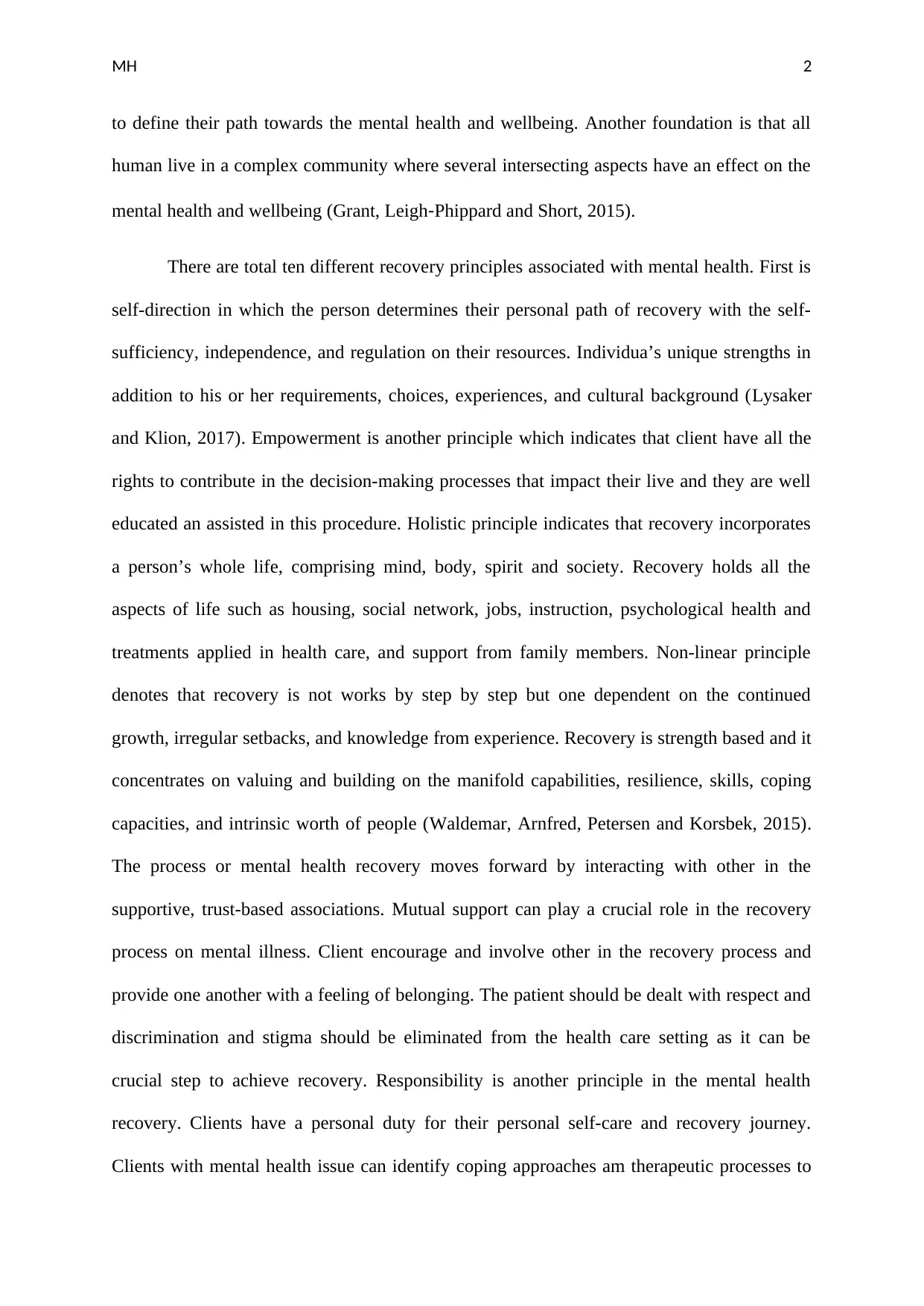
MH 2
to define their path towards the mental health and wellbeing. Another foundation is that all
human live in a complex community where several intersecting aspects have an effect on the
mental health and wellbeing (Grant, Leigh‐Phippard and Short, 2015).
There are total ten different recovery principles associated with mental health. First is
self-direction in which the person determines their personal path of recovery with the self-
sufficiency, independence, and regulation on their resources. Individua’s unique strengths in
addition to his or her requirements, choices, experiences, and cultural background (Lysaker
and Klion, 2017). Empowerment is another principle which indicates that client have all the
rights to contribute in the decision-making processes that impact their live and they are well
educated an assisted in this procedure. Holistic principle indicates that recovery incorporates
a person’s whole life, comprising mind, body, spirit and society. Recovery holds all the
aspects of life such as housing, social network, jobs, instruction, psychological health and
treatments applied in health care, and support from family members. Non-linear principle
denotes that recovery is not works by step by step but one dependent on the continued
growth, irregular setbacks, and knowledge from experience. Recovery is strength based and it
concentrates on valuing and building on the manifold capabilities, resilience, skills, coping
capacities, and intrinsic worth of people (Waldemar, Arnfred, Petersen and Korsbek, 2015).
The process or mental health recovery moves forward by interacting with other in the
supportive, trust-based associations. Mutual support can play a crucial role in the recovery
process on mental illness. Client encourage and involve other in the recovery process and
provide one another with a feeling of belonging. The patient should be dealt with respect and
discrimination and stigma should be eliminated from the health care setting as it can be
crucial step to achieve recovery. Responsibility is another principle in the mental health
recovery. Clients have a personal duty for their personal self-care and recovery journey.
Clients with mental health issue can identify coping approaches am therapeutic processes to
to define their path towards the mental health and wellbeing. Another foundation is that all
human live in a complex community where several intersecting aspects have an effect on the
mental health and wellbeing (Grant, Leigh‐Phippard and Short, 2015).
There are total ten different recovery principles associated with mental health. First is
self-direction in which the person determines their personal path of recovery with the self-
sufficiency, independence, and regulation on their resources. Individua’s unique strengths in
addition to his or her requirements, choices, experiences, and cultural background (Lysaker
and Klion, 2017). Empowerment is another principle which indicates that client have all the
rights to contribute in the decision-making processes that impact their live and they are well
educated an assisted in this procedure. Holistic principle indicates that recovery incorporates
a person’s whole life, comprising mind, body, spirit and society. Recovery holds all the
aspects of life such as housing, social network, jobs, instruction, psychological health and
treatments applied in health care, and support from family members. Non-linear principle
denotes that recovery is not works by step by step but one dependent on the continued
growth, irregular setbacks, and knowledge from experience. Recovery is strength based and it
concentrates on valuing and building on the manifold capabilities, resilience, skills, coping
capacities, and intrinsic worth of people (Waldemar, Arnfred, Petersen and Korsbek, 2015).
The process or mental health recovery moves forward by interacting with other in the
supportive, trust-based associations. Mutual support can play a crucial role in the recovery
process on mental illness. Client encourage and involve other in the recovery process and
provide one another with a feeling of belonging. The patient should be dealt with respect and
discrimination and stigma should be eliminated from the health care setting as it can be
crucial step to achieve recovery. Responsibility is another principle in the mental health
recovery. Clients have a personal duty for their personal self-care and recovery journey.
Clients with mental health issue can identify coping approaches am therapeutic processes to
⊘ This is a preview!⊘
Do you want full access?
Subscribe today to unlock all pages.

Trusted by 1+ million students worldwide
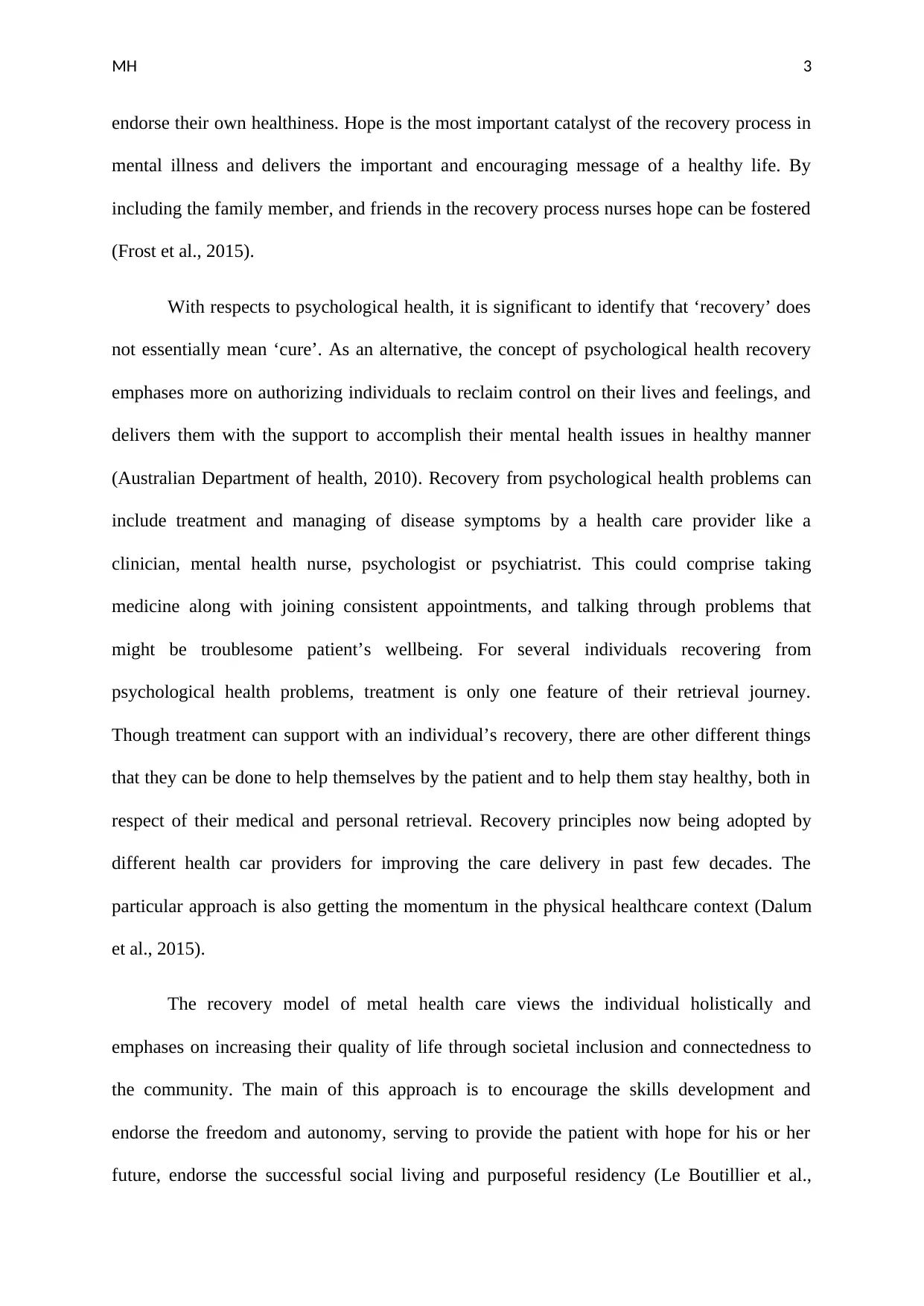
MH 3
endorse their own healthiness. Hope is the most important catalyst of the recovery process in
mental illness and delivers the important and encouraging message of a healthy life. By
including the family member, and friends in the recovery process nurses hope can be fostered
(Frost et al., 2015).
With respects to psychological health, it is significant to identify that ‘recovery’ does
not essentially mean ‘cure’. As an alternative, the concept of psychological health recovery
emphases more on authorizing individuals to reclaim control on their lives and feelings, and
delivers them with the support to accomplish their mental health issues in healthy manner
(Australian Department of health, 2010). Recovery from psychological health problems can
include treatment and managing of disease symptoms by a health care provider like a
clinician, mental health nurse, psychologist or psychiatrist. This could comprise taking
medicine along with joining consistent appointments, and talking through problems that
might be troublesome patient’s wellbeing. For several individuals recovering from
psychological health problems, treatment is only one feature of their retrieval journey.
Though treatment can support with an individual’s recovery, there are other different things
that they can be done to help themselves by the patient and to help them stay healthy, both in
respect of their medical and personal retrieval. Recovery principles now being adopted by
different health car providers for improving the care delivery in past few decades. The
particular approach is also getting the momentum in the physical healthcare context (Dalum
et al., 2015).
The recovery model of metal health care views the individual holistically and
emphases on increasing their quality of life through societal inclusion and connectedness to
the community. The main of this approach is to encourage the skills development and
endorse the freedom and autonomy, serving to provide the patient with hope for his or her
future, endorse the successful social living and purposeful residency (Le Boutillier et al.,
endorse their own healthiness. Hope is the most important catalyst of the recovery process in
mental illness and delivers the important and encouraging message of a healthy life. By
including the family member, and friends in the recovery process nurses hope can be fostered
(Frost et al., 2015).
With respects to psychological health, it is significant to identify that ‘recovery’ does
not essentially mean ‘cure’. As an alternative, the concept of psychological health recovery
emphases more on authorizing individuals to reclaim control on their lives and feelings, and
delivers them with the support to accomplish their mental health issues in healthy manner
(Australian Department of health, 2010). Recovery from psychological health problems can
include treatment and managing of disease symptoms by a health care provider like a
clinician, mental health nurse, psychologist or psychiatrist. This could comprise taking
medicine along with joining consistent appointments, and talking through problems that
might be troublesome patient’s wellbeing. For several individuals recovering from
psychological health problems, treatment is only one feature of their retrieval journey.
Though treatment can support with an individual’s recovery, there are other different things
that they can be done to help themselves by the patient and to help them stay healthy, both in
respect of their medical and personal retrieval. Recovery principles now being adopted by
different health car providers for improving the care delivery in past few decades. The
particular approach is also getting the momentum in the physical healthcare context (Dalum
et al., 2015).
The recovery model of metal health care views the individual holistically and
emphases on increasing their quality of life through societal inclusion and connectedness to
the community. The main of this approach is to encourage the skills development and
endorse the freedom and autonomy, serving to provide the patient with hope for his or her
future, endorse the successful social living and purposeful residency (Le Boutillier et al.,
Paraphrase This Document
Need a fresh take? Get an instant paraphrase of this document with our AI Paraphraser
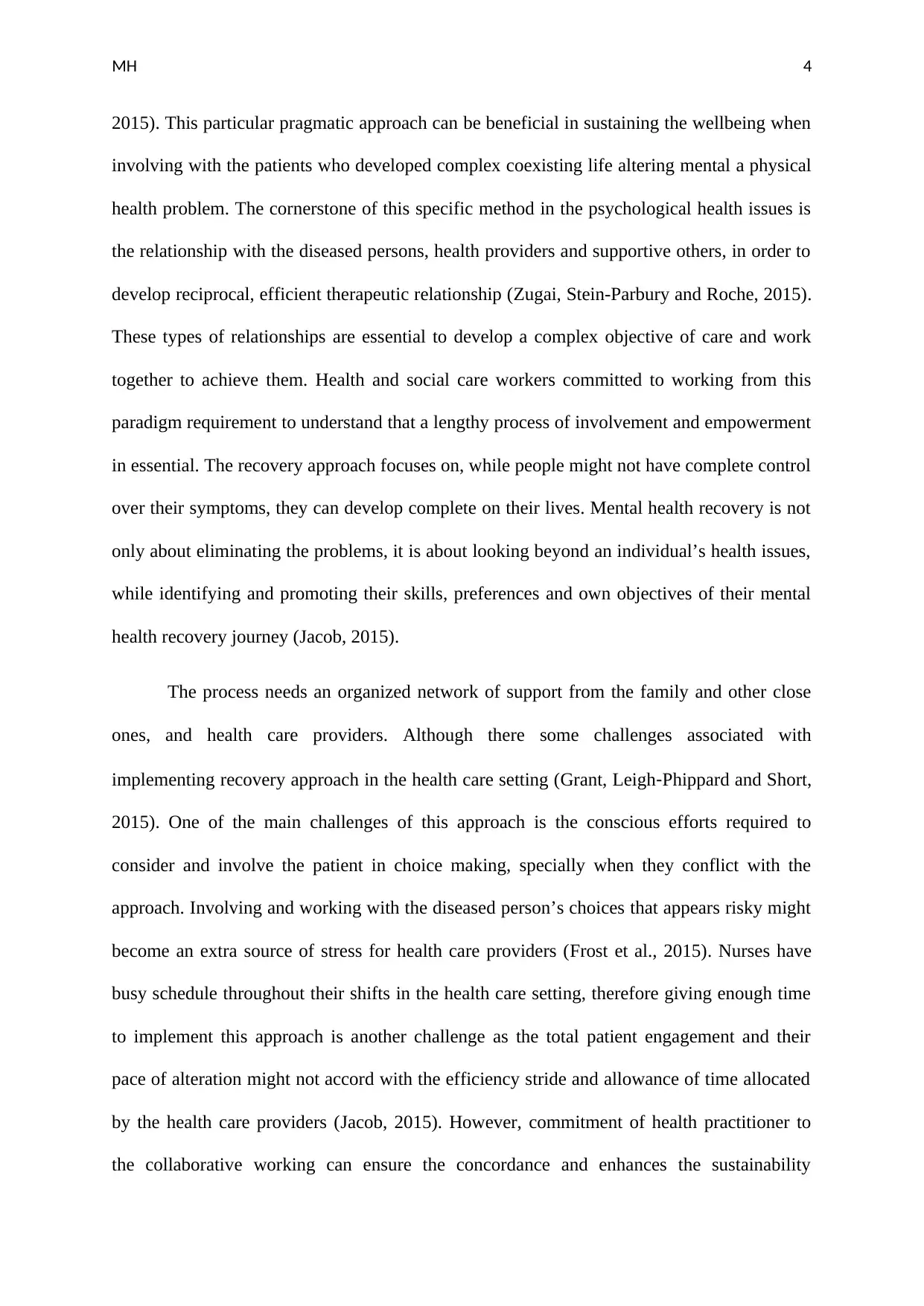
MH 4
2015). This particular pragmatic approach can be beneficial in sustaining the wellbeing when
involving with the patients who developed complex coexisting life altering mental a physical
health problem. The cornerstone of this specific method in the psychological health issues is
the relationship with the diseased persons, health providers and supportive others, in order to
develop reciprocal, efficient therapeutic relationship (Zugai, Stein-Parbury and Roche, 2015).
These types of relationships are essential to develop a complex objective of care and work
together to achieve them. Health and social care workers committed to working from this
paradigm requirement to understand that a lengthy process of involvement and empowerment
in essential. The recovery approach focuses on, while people might not have complete control
over their symptoms, they can develop complete on their lives. Mental health recovery is not
only about eliminating the problems, it is about looking beyond an individual’s health issues,
while identifying and promoting their skills, preferences and own objectives of their mental
health recovery journey (Jacob, 2015).
The process needs an organized network of support from the family and other close
ones, and health care providers. Although there some challenges associated with
implementing recovery approach in the health care setting (Grant, Leigh‐Phippard and Short,
2015). One of the main challenges of this approach is the conscious efforts required to
consider and involve the patient in choice making, specially when they conflict with the
approach. Involving and working with the diseased person’s choices that appears risky might
become an extra source of stress for health care providers (Frost et al., 2015). Nurses have
busy schedule throughout their shifts in the health care setting, therefore giving enough time
to implement this approach is another challenge as the total patient engagement and their
pace of alteration might not accord with the efficiency stride and allowance of time allocated
by the health care providers (Jacob, 2015). However, commitment of health practitioner to
the collaborative working can ensure the concordance and enhances the sustainability
2015). This particular pragmatic approach can be beneficial in sustaining the wellbeing when
involving with the patients who developed complex coexisting life altering mental a physical
health problem. The cornerstone of this specific method in the psychological health issues is
the relationship with the diseased persons, health providers and supportive others, in order to
develop reciprocal, efficient therapeutic relationship (Zugai, Stein-Parbury and Roche, 2015).
These types of relationships are essential to develop a complex objective of care and work
together to achieve them. Health and social care workers committed to working from this
paradigm requirement to understand that a lengthy process of involvement and empowerment
in essential. The recovery approach focuses on, while people might not have complete control
over their symptoms, they can develop complete on their lives. Mental health recovery is not
only about eliminating the problems, it is about looking beyond an individual’s health issues,
while identifying and promoting their skills, preferences and own objectives of their mental
health recovery journey (Jacob, 2015).
The process needs an organized network of support from the family and other close
ones, and health care providers. Although there some challenges associated with
implementing recovery approach in the health care setting (Grant, Leigh‐Phippard and Short,
2015). One of the main challenges of this approach is the conscious efforts required to
consider and involve the patient in choice making, specially when they conflict with the
approach. Involving and working with the diseased person’s choices that appears risky might
become an extra source of stress for health care providers (Frost et al., 2015). Nurses have
busy schedule throughout their shifts in the health care setting, therefore giving enough time
to implement this approach is another challenge as the total patient engagement and their
pace of alteration might not accord with the efficiency stride and allowance of time allocated
by the health care providers (Jacob, 2015). However, commitment of health practitioner to
the collaborative working can ensure the concordance and enhances the sustainability
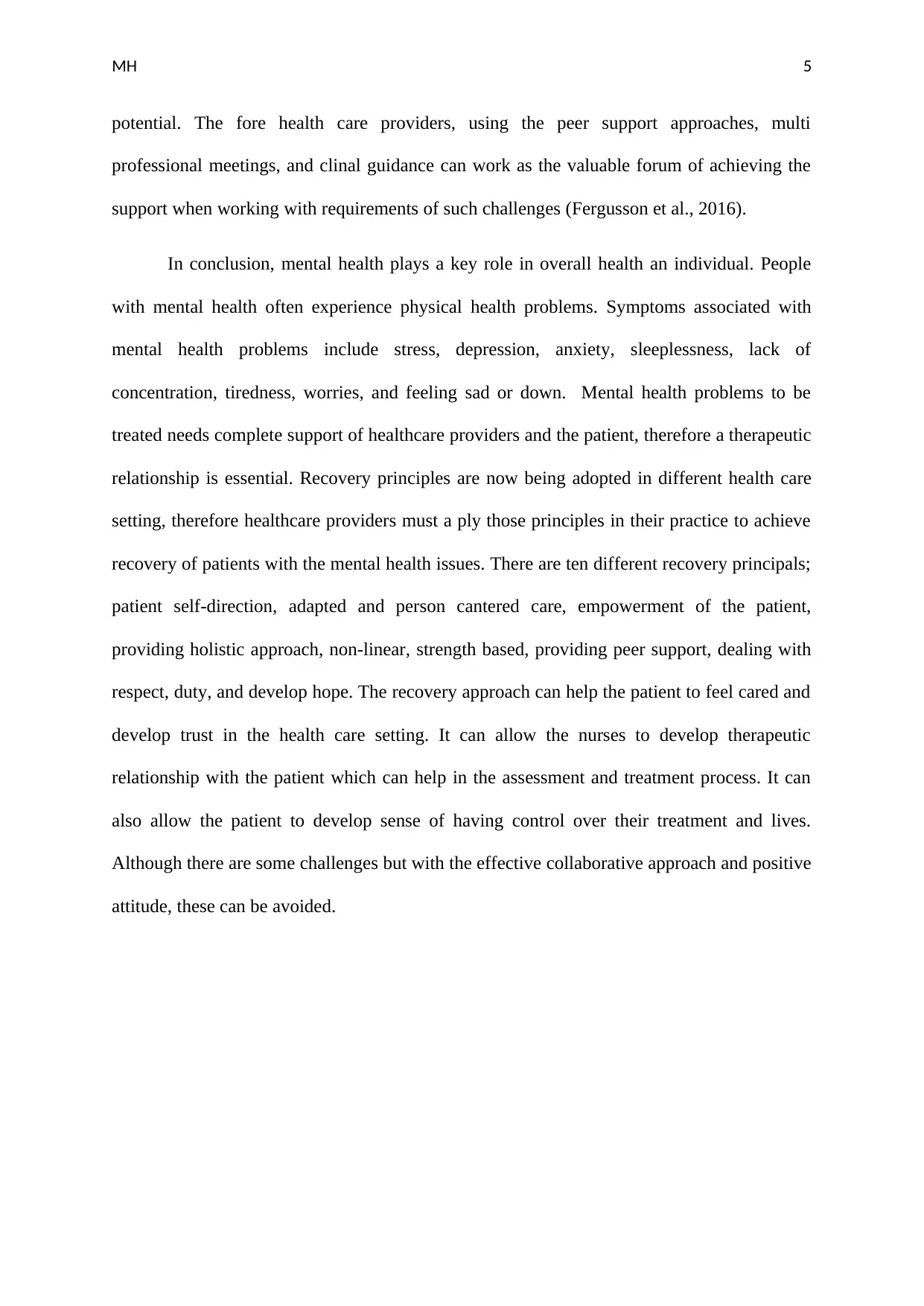
MH 5
potential. The fore health care providers, using the peer support approaches, multi
professional meetings, and clinal guidance can work as the valuable forum of achieving the
support when working with requirements of such challenges (Fergusson et al., 2016).
In conclusion, mental health plays a key role in overall health an individual. People
with mental health often experience physical health problems. Symptoms associated with
mental health problems include stress, depression, anxiety, sleeplessness, lack of
concentration, tiredness, worries, and feeling sad or down. Mental health problems to be
treated needs complete support of healthcare providers and the patient, therefore a therapeutic
relationship is essential. Recovery principles are now being adopted in different health care
setting, therefore healthcare providers must a ply those principles in their practice to achieve
recovery of patients with the mental health issues. There are ten different recovery principals;
patient self-direction, adapted and person cantered care, empowerment of the patient,
providing holistic approach, non-linear, strength based, providing peer support, dealing with
respect, duty, and develop hope. The recovery approach can help the patient to feel cared and
develop trust in the health care setting. It can allow the nurses to develop therapeutic
relationship with the patient which can help in the assessment and treatment process. It can
also allow the patient to develop sense of having control over their treatment and lives.
Although there are some challenges but with the effective collaborative approach and positive
attitude, these can be avoided.
potential. The fore health care providers, using the peer support approaches, multi
professional meetings, and clinal guidance can work as the valuable forum of achieving the
support when working with requirements of such challenges (Fergusson et al., 2016).
In conclusion, mental health plays a key role in overall health an individual. People
with mental health often experience physical health problems. Symptoms associated with
mental health problems include stress, depression, anxiety, sleeplessness, lack of
concentration, tiredness, worries, and feeling sad or down. Mental health problems to be
treated needs complete support of healthcare providers and the patient, therefore a therapeutic
relationship is essential. Recovery principles are now being adopted in different health care
setting, therefore healthcare providers must a ply those principles in their practice to achieve
recovery of patients with the mental health issues. There are ten different recovery principals;
patient self-direction, adapted and person cantered care, empowerment of the patient,
providing holistic approach, non-linear, strength based, providing peer support, dealing with
respect, duty, and develop hope. The recovery approach can help the patient to feel cared and
develop trust in the health care setting. It can allow the nurses to develop therapeutic
relationship with the patient which can help in the assessment and treatment process. It can
also allow the patient to develop sense of having control over their treatment and lives.
Although there are some challenges but with the effective collaborative approach and positive
attitude, these can be avoided.
⊘ This is a preview!⊘
Do you want full access?
Subscribe today to unlock all pages.

Trusted by 1+ million students worldwide
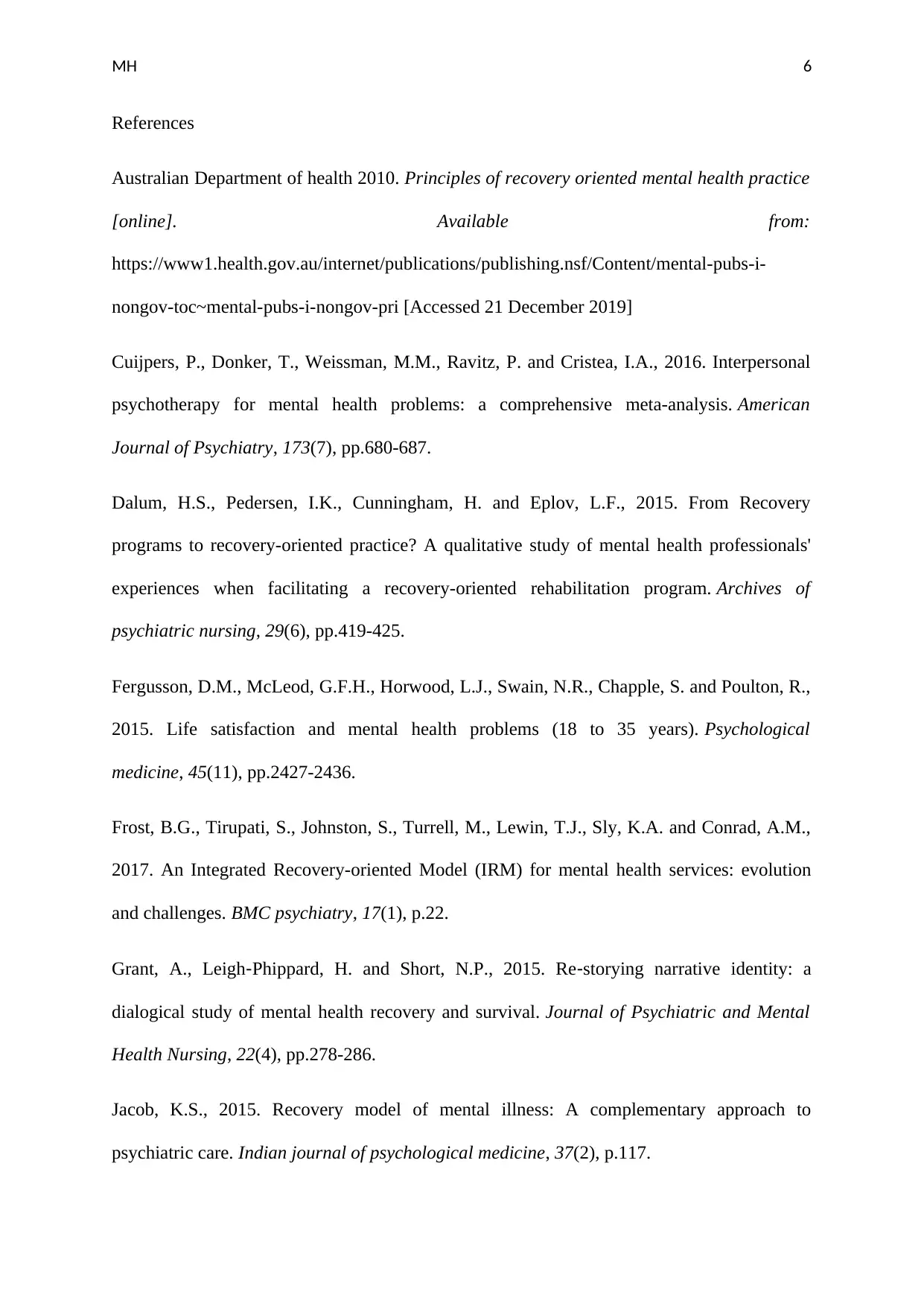
MH 6
References
Australian Department of health 2010. Principles of recovery oriented mental health practice
[online]. Available from:
https://www1.health.gov.au/internet/publications/publishing.nsf/Content/mental-pubs-i-
nongov-toc~mental-pubs-i-nongov-pri [Accessed 21 December 2019]
Cuijpers, P., Donker, T., Weissman, M.M., Ravitz, P. and Cristea, I.A., 2016. Interpersonal
psychotherapy for mental health problems: a comprehensive meta-analysis. American
Journal of Psychiatry, 173(7), pp.680-687.
Dalum, H.S., Pedersen, I.K., Cunningham, H. and Eplov, L.F., 2015. From Recovery
programs to recovery-oriented practice? A qualitative study of mental health professionals'
experiences when facilitating a recovery-oriented rehabilitation program. Archives of
psychiatric nursing, 29(6), pp.419-425.
Fergusson, D.M., McLeod, G.F.H., Horwood, L.J., Swain, N.R., Chapple, S. and Poulton, R.,
2015. Life satisfaction and mental health problems (18 to 35 years). Psychological
medicine, 45(11), pp.2427-2436.
Frost, B.G., Tirupati, S., Johnston, S., Turrell, M., Lewin, T.J., Sly, K.A. and Conrad, A.M.,
2017. An Integrated Recovery-oriented Model (IRM) for mental health services: evolution
and challenges. BMC psychiatry, 17(1), p.22.
Grant, A., Leigh‐Phippard, H. and Short, N.P., 2015. Re‐storying narrative identity: a
dialogical study of mental health recovery and survival. Journal of Psychiatric and Mental
Health Nursing, 22(4), pp.278-286.
Jacob, K.S., 2015. Recovery model of mental illness: A complementary approach to
psychiatric care. Indian journal of psychological medicine, 37(2), p.117.
References
Australian Department of health 2010. Principles of recovery oriented mental health practice
[online]. Available from:
https://www1.health.gov.au/internet/publications/publishing.nsf/Content/mental-pubs-i-
nongov-toc~mental-pubs-i-nongov-pri [Accessed 21 December 2019]
Cuijpers, P., Donker, T., Weissman, M.M., Ravitz, P. and Cristea, I.A., 2016. Interpersonal
psychotherapy for mental health problems: a comprehensive meta-analysis. American
Journal of Psychiatry, 173(7), pp.680-687.
Dalum, H.S., Pedersen, I.K., Cunningham, H. and Eplov, L.F., 2015. From Recovery
programs to recovery-oriented practice? A qualitative study of mental health professionals'
experiences when facilitating a recovery-oriented rehabilitation program. Archives of
psychiatric nursing, 29(6), pp.419-425.
Fergusson, D.M., McLeod, G.F.H., Horwood, L.J., Swain, N.R., Chapple, S. and Poulton, R.,
2015. Life satisfaction and mental health problems (18 to 35 years). Psychological
medicine, 45(11), pp.2427-2436.
Frost, B.G., Tirupati, S., Johnston, S., Turrell, M., Lewin, T.J., Sly, K.A. and Conrad, A.M.,
2017. An Integrated Recovery-oriented Model (IRM) for mental health services: evolution
and challenges. BMC psychiatry, 17(1), p.22.
Grant, A., Leigh‐Phippard, H. and Short, N.P., 2015. Re‐storying narrative identity: a
dialogical study of mental health recovery and survival. Journal of Psychiatric and Mental
Health Nursing, 22(4), pp.278-286.
Jacob, K.S., 2015. Recovery model of mental illness: A complementary approach to
psychiatric care. Indian journal of psychological medicine, 37(2), p.117.
Paraphrase This Document
Need a fresh take? Get an instant paraphrase of this document with our AI Paraphraser
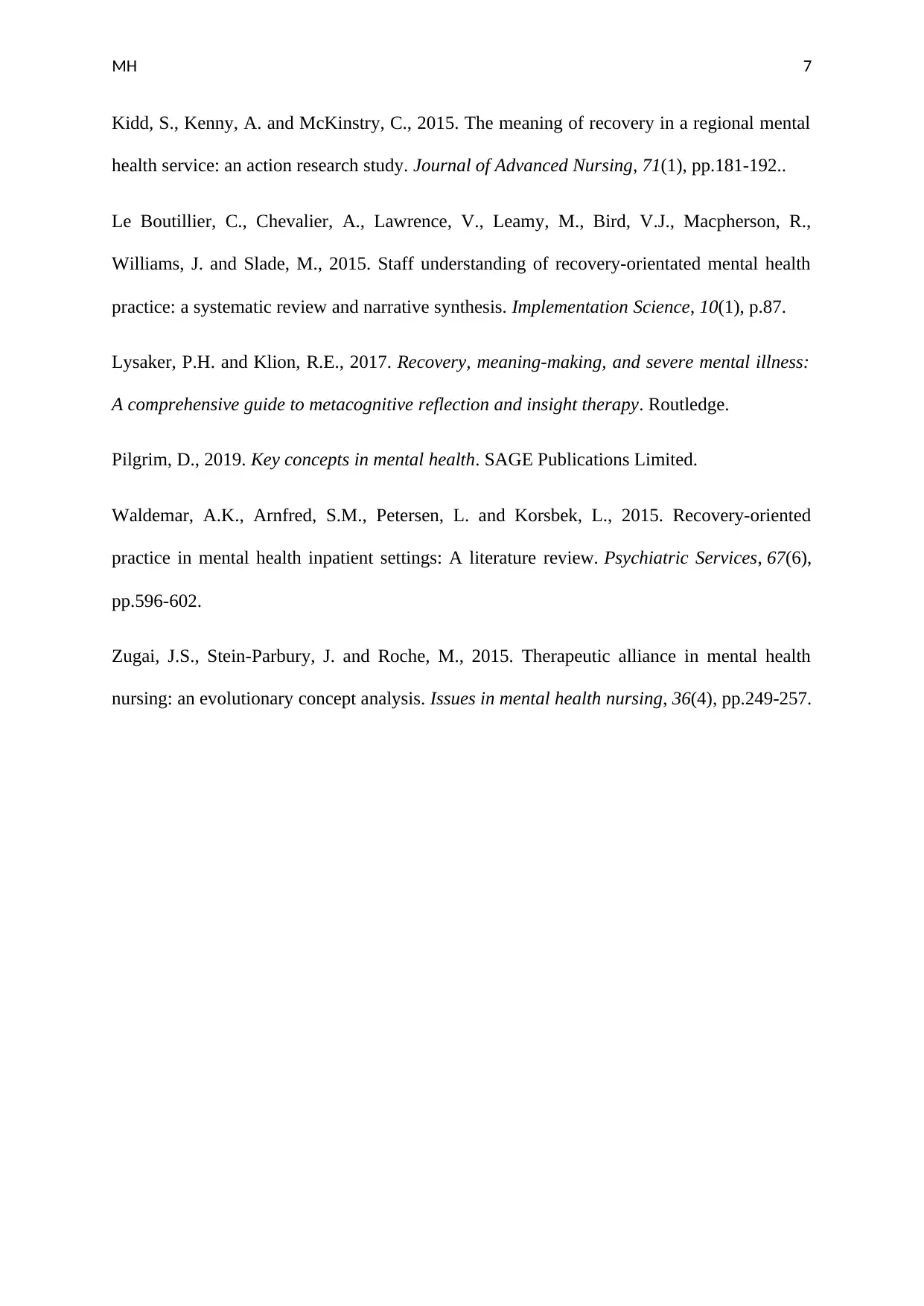
MH 7
Kidd, S., Kenny, A. and McKinstry, C., 2015. The meaning of recovery in a regional mental
health service: an action research study. Journal of Advanced Nursing, 71(1), pp.181-192..
Le Boutillier, C., Chevalier, A., Lawrence, V., Leamy, M., Bird, V.J., Macpherson, R.,
Williams, J. and Slade, M., 2015. Staff understanding of recovery-orientated mental health
practice: a systematic review and narrative synthesis. Implementation Science, 10(1), p.87.
Lysaker, P.H. and Klion, R.E., 2017. Recovery, meaning-making, and severe mental illness:
A comprehensive guide to metacognitive reflection and insight therapy. Routledge.
Pilgrim, D., 2019. Key concepts in mental health. SAGE Publications Limited.
Waldemar, A.K., Arnfred, S.M., Petersen, L. and Korsbek, L., 2015. Recovery-oriented
practice in mental health inpatient settings: A literature review. Psychiatric Services, 67(6),
pp.596-602.
Zugai, J.S., Stein-Parbury, J. and Roche, M., 2015. Therapeutic alliance in mental health
nursing: an evolutionary concept analysis. Issues in mental health nursing, 36(4), pp.249-257.
Kidd, S., Kenny, A. and McKinstry, C., 2015. The meaning of recovery in a regional mental
health service: an action research study. Journal of Advanced Nursing, 71(1), pp.181-192..
Le Boutillier, C., Chevalier, A., Lawrence, V., Leamy, M., Bird, V.J., Macpherson, R.,
Williams, J. and Slade, M., 2015. Staff understanding of recovery-orientated mental health
practice: a systematic review and narrative synthesis. Implementation Science, 10(1), p.87.
Lysaker, P.H. and Klion, R.E., 2017. Recovery, meaning-making, and severe mental illness:
A comprehensive guide to metacognitive reflection and insight therapy. Routledge.
Pilgrim, D., 2019. Key concepts in mental health. SAGE Publications Limited.
Waldemar, A.K., Arnfred, S.M., Petersen, L. and Korsbek, L., 2015. Recovery-oriented
practice in mental health inpatient settings: A literature review. Psychiatric Services, 67(6),
pp.596-602.
Zugai, J.S., Stein-Parbury, J. and Roche, M., 2015. Therapeutic alliance in mental health
nursing: an evolutionary concept analysis. Issues in mental health nursing, 36(4), pp.249-257.
1 out of 8
Related Documents
Your All-in-One AI-Powered Toolkit for Academic Success.
+13062052269
info@desklib.com
Available 24*7 on WhatsApp / Email
![[object Object]](/_next/static/media/star-bottom.7253800d.svg)
Unlock your academic potential
Copyright © 2020–2025 A2Z Services. All Rights Reserved. Developed and managed by ZUCOL.




